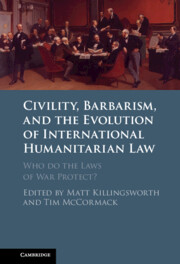 Civility, Barbarism and the Evolution of International Humanitarian Law
Civility, Barbarism and the Evolution of International Humanitarian Law The Future of Justice in Conflict
Published online by Cambridge University Press: 11 January 2024
The creation of the International Criminal Court (ICC) is a game changer in the relationship between conflict resolution and the pursuit of accountability for mass atrocities. No longer must wars end before international criminal justice is pursued. But the ICC’s forays into situations of ongoing hostilities have not been kind to perceptions of the Court’s role in contributing to peace or in-conflict accountability. Twenty years after its creation, there are signs that the ICC is increasingly reluctant to target individuals engaged in ongoing wars. This chapter illustrates how perceptions of the ICC have been undermined by its forays into active conflicts and how this has resulted in an apparent reluctance to pursue active belligerents. Reflecting on the future of justice in conflict, it also examines what the Court can do to ameliorate perceptions of its impacts on peace and how to build stronger cases against alleged perpetrators involved in active wars.
To save this book to your Kindle, first ensure no-reply@cambridge.org is added to your Approved Personal Document E-mail List under your Personal Document Settings on the Manage Your Content and Devices page of your Amazon account. Then enter the ‘name’ part of your Kindle email address below. Find out more about saving to your Kindle.
Note you can select to save to either the @free.kindle.com or @kindle.com variations. ‘@free.kindle.com’ emails are free but can only be saved to your device when it is connected to wi-fi. ‘@kindle.com’ emails can be delivered even when you are not connected to wi-fi, but note that service fees apply.
Find out more about the Kindle Personal Document Service.
To save content items to your account, please confirm that you agree to abide by our usage policies. If this is the first time you use this feature, you will be asked to authorise Cambridge Core to connect with your account. Find out more about saving content to Dropbox.
To save content items to your account, please confirm that you agree to abide by our usage policies. If this is the first time you use this feature, you will be asked to authorise Cambridge Core to connect with your account. Find out more about saving content to Google Drive.